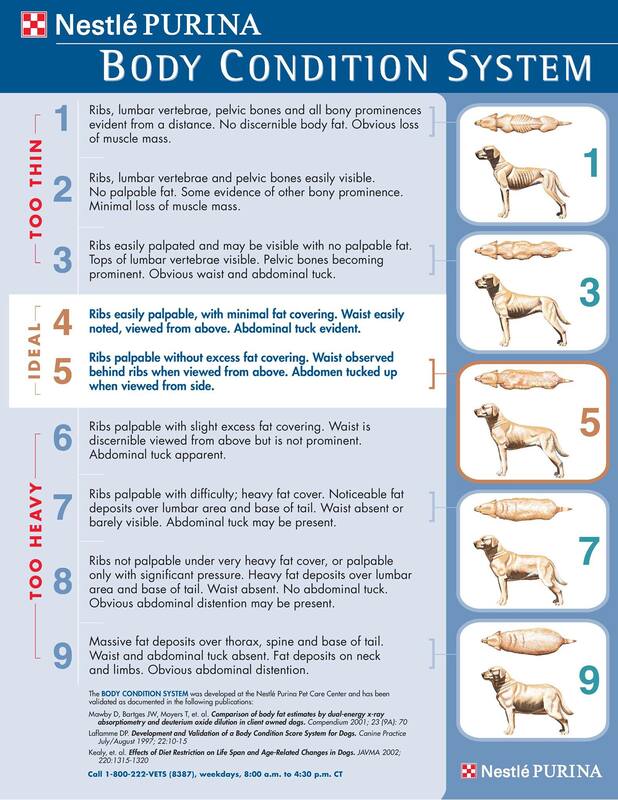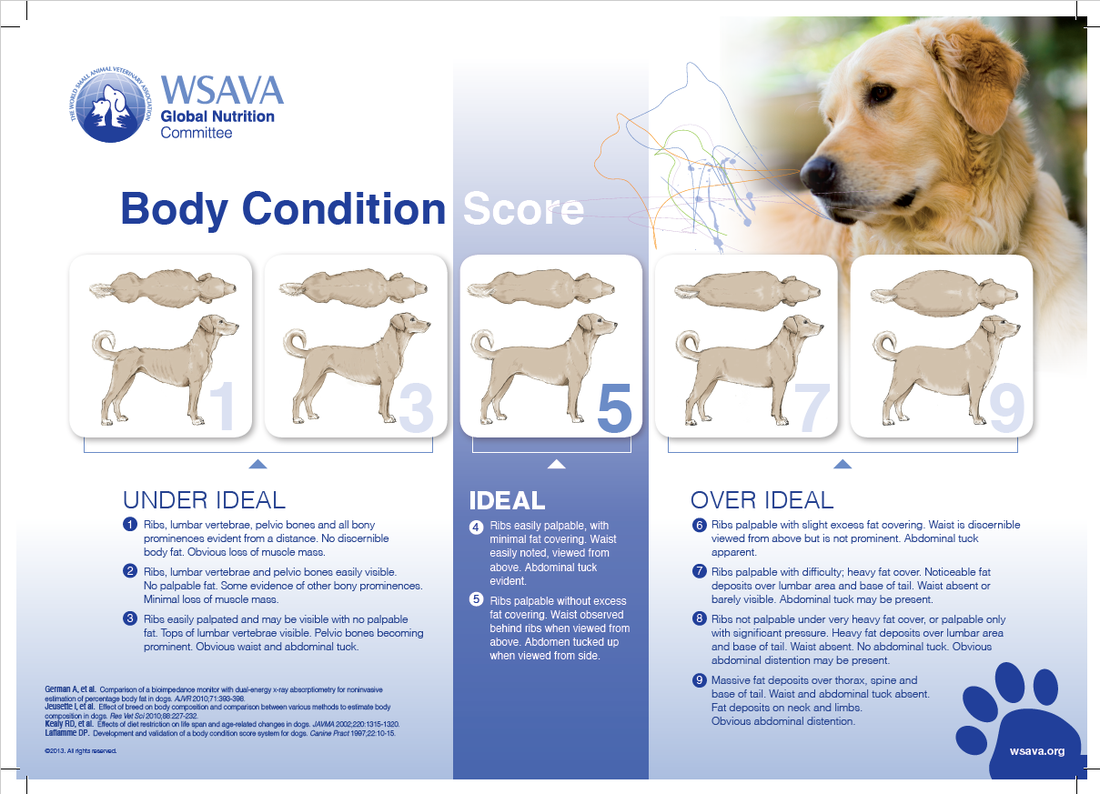Healthy Body Condition
for Miniature American & Australian Shepherds
The first step is acknowledgement!
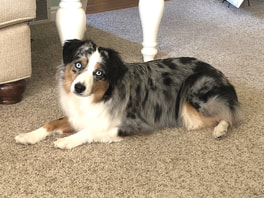
Overweight pets are becoming an epidemic in the pet community. Many pet owners perceive overweight as "normal" or they misunderstand and assume it means they are well-loved by being a little heavier. It is important to remind ourselves what an appropriate and healthy weight is for our dogs. Please read more to learn how you can access your pets weight and become aware of how you may be able to help them become healthier!
Health concerns related to overweight pets:
A lot of pet owners don't understand the negative effects and health concerns related to overweight pets. Some of these medical concerns can be exacerbated by a pet being overweight:
- Joint problems
- Osteoarthritis
- ACL/CCL tears
- Diabetes
- High blood pressure
- Weakened Immune System
- Exercise Intolerance
- Difficulty Breathing
- Kidney Disease
- Cardiac Disease
- Cancer, and more.
Body Condition Scoring Chart:
Please See Full Chart Below!
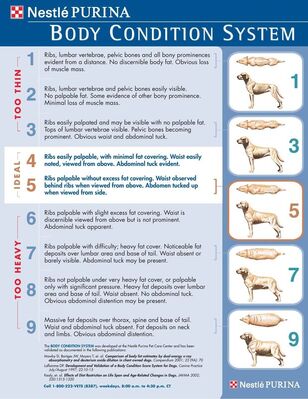
The best way to describe your dog is by using the Body Condition Scoring chart. This chart is located at the bottom of this page. It has 1-9 options whereas others have 1-5 options. Keep in mind this chart does not adequately describe all breeds so reading the description and feeling your OWN dog is really important. Feeling your dog's chest, ribs, waist, and tummy will be the most important for determining if your pet is overweight. Sometime's pictures can be deceiving if it is not obvious. Often times it helps to get your dog wet so their fluffy coat doesn't deceive you. As a dog matures, some breeds will fill out and broaden a little bit but you should still be able to feel if they have more "plush" than they should. It is always a good idea to ask your veterinarian for their opinion and recommendations as well.
Miniature American Shepherds and Miniature Australian Shepherds can vary A LOT in weight because of height differences, width and depth of chest, and amount of bone so it is NOT recommended to compare one dog to another just based on weight. Generally speaking, many Australian Shepherds and related breeds don't have an extreme tuck through the abdomen like some other breeds do. Most of the time, a dog is overweight because they are on a diet that is too high in calories (fed too much, poor diet) and the dog's body stores the energy just like ours (lack of exercise). In some cases, it can be related to a medical issue such as hypothyroidism which can be checked through bloodwork by your veterinarian.
Miniature American Shepherds and Miniature Australian Shepherds can vary A LOT in weight because of height differences, width and depth of chest, and amount of bone so it is NOT recommended to compare one dog to another just based on weight. Generally speaking, many Australian Shepherds and related breeds don't have an extreme tuck through the abdomen like some other breeds do. Most of the time, a dog is overweight because they are on a diet that is too high in calories (fed too much, poor diet) and the dog's body stores the energy just like ours (lack of exercise). In some cases, it can be related to a medical issue such as hypothyroidism which can be checked through bloodwork by your veterinarian.
SEE FULL CHART BELOW!
What can you do to help your pet lose weight?
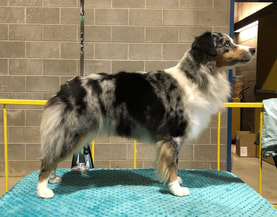
If you feel your pet is heavier than they should be, there are some steps you can take:
1. Decrease caloric intake by 10-30%. (Don't free feed.) It can take several months to see a change so be patient. Try your best to cut out most human foods as it really packs on the calories and is usually not a healthy option.
2. Replace percentage of food with low calorie things like unsalted green beans & carrots. Cut out large treats and use these options (or even portions of their dog food) as training treats.
3. Increase Physical Exercise. Take your dogs on more walks, hikes, bike rides... play frisbee, ball, etc.
4. Do some research to make sure you are feeding a quality food.
Once you move toward this awesome goal for your pet, don't be discouraged if you don't see results right away. It may take some time. Anyway from a couple of weeks to a several months depending on how much your pet needs to loose and how much you change their diet and routine. If these steps don't help your pooch on their way to a healthier weight, you may need to reduce their caloric intake even further if you didn't change a lot to begin with.
Before doing so, please talk to your veterinarian to rule out medical concerns for weight gain such as hypothyroidism, growing masses, etc.
1. Decrease caloric intake by 10-30%. (Don't free feed.) It can take several months to see a change so be patient. Try your best to cut out most human foods as it really packs on the calories and is usually not a healthy option.
2. Replace percentage of food with low calorie things like unsalted green beans & carrots. Cut out large treats and use these options (or even portions of their dog food) as training treats.
3. Increase Physical Exercise. Take your dogs on more walks, hikes, bike rides... play frisbee, ball, etc.
4. Do some research to make sure you are feeding a quality food.
Once you move toward this awesome goal for your pet, don't be discouraged if you don't see results right away. It may take some time. Anyway from a couple of weeks to a several months depending on how much your pet needs to loose and how much you change their diet and routine. If these steps don't help your pooch on their way to a healthier weight, you may need to reduce their caloric intake even further if you didn't change a lot to begin with.
Before doing so, please talk to your veterinarian to rule out medical concerns for weight gain such as hypothyroidism, growing masses, etc.
